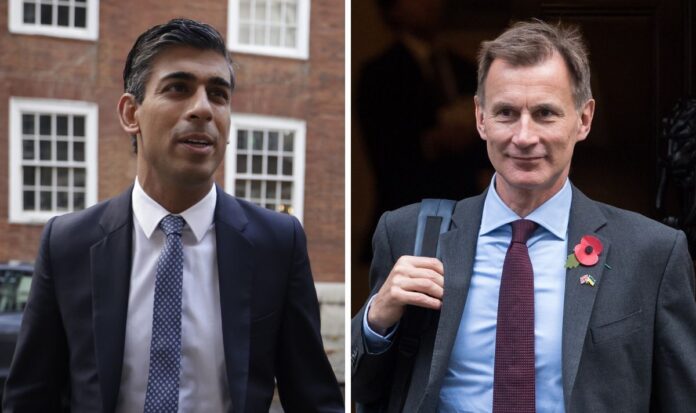On Thursday November 17, Chancellor Jeremy Hunt will be delivering the Autumn Statement, which will announce new tax and spending plans under the new Government. The 45 percent rate of income tax for those earning £150,000 is expected to be lowered to those earning £125,000, meaning 245,000 more Brits will be paying more income tax.Around 600,000 of Britain’s top earners who already pay the highest income tax may have their bills rise by £1,250.It comes at a time the National Institute of Economic and Social Research has warned against tax increases and said they could “further damage the country’s already anaemic growth prospects”.Professor Stephen Millard from the Institute said: “With the economy still reeling from the effects of the terrible Russian invasion of Ukraine and the Monetary Policy Committee raising interest rates to bear down on inflation, now is not the time to be tightening fiscal policy.”The Chancellor warned in October that “decisions of eye-watering difficulty” lie ahead as the Government tries to fill an estimated £50,000 billion black hole in public finances.The new tax income measure could help the Government raise £1.3 billion a year.It also means the Conservative party has not technically broken their 2019 manifesto pledge to not increase income tax, as income tax thresholds are expected to be frozen for two more years. Rishi Sunak and Jeremy Hunt are expected to put more Brits in highest tax bracket (Image: Getty Images)Other measures the Government are expected to announce next week may include an increase in the profits of energy companies and it is expected that the windfall tax on oil and gas companies will raise from 25 to 35 percent.It is also thought that the Government will be announcing cuts to public spending, which may affect the NHS, schools and police departments.Certain parts of the Autumn Statement will affect the whole of Britain, however, the governments of Scotland, Wales and Northern Ireland will be making some financial decisions independently.In Scotland, the government has announced £615 million worth of spending cuts on top of the £560 million in cuts announced in September.Scotland’s Deputy First Minister, John Swinney, has said the financial situation Scotland faces is it’s most challenging since devolution, as the current inflation rate means the country’s budget is worth £1.7 billion less than it was last year.READ MORE: Sunak must find balancing act to slash debt but avoid recession The 45p rate of income tax for those earning £150,000 is expected to be lowered to £125,000 (Image: Getty Images)The former Chancellor under Liz Truss, Kwasi Kwarteng, originally announced in September that the 45 percent rate of income tax would be abolished.However, the former Government quickly abandoned the policy after market instability from their mini-budget announcement caused the pound the fall and caused backlash within the Conservative Party.At the time, Mr Kwarteng said: “It is clear that the abolition of the 45p tax rate has become a distraction from our overriding mission to tackle the challenges facing our country.”On BBC Breakfast, when the former Chancellor was asked if he owed Britain an apology for his Government’s changing policy, he said: “We’ve listened to people. And yeah, there is humility and contrition in that. And I’m happy to own it.”DON’T MISS: Britain’s economy can bounce back, insists Jeremy Hunt [REPORT]’The next 6 months will be tough for many as the UK faces recession’ [INSIGHT]The UK’s last recession and why the next one ‘will be the worst’ [REVEAL]”Around a third of the world’s economy is in recession this year or will be in recession next year & that is principally, but not entirely, because of very high energy prices. We are not immune to that in the UK”.Chancellor @Jeremy_Hunt responds to today’s @ONS statistics. pic.twitter.com/AvXmrEjwjk- HM Treasury (@hmtreasury) November 11, 2022 On Friday, Mr Sunak and Mr Hunt met to finalise their economic plans, and it comes as the Office for National Statistics announced that the UK economy shrank by 0.2 percent in the third quarter of 2022.Mr Hunt also said on Friday that Britain is “not immune from the global challenge of his inflation’ and also warned about the severity of the plans set in the Autumn Statment.He said: “I am under no illusion that there is a tough road ahead – one which will require extremely difficult decisions to restore confidence and economic stability.”But to achieve long-term, sustainable growth, we need to grip inflation, balance the books and get debt falling. There is no other way.”


